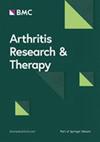作为系统性红斑狼疮损伤和缓解生物标志物的新型内皮祖细胞群
IF 4.9
2区 医学
Q1 Medicine
引用次数: 0
摘要
内皮祖细胞(EPCs)是维持血管平衡和稳定的关键,也是系统性红斑狼疮(SLE)发病机制的关键过程。然而,EPCs 群体在系统性红斑狼疮中的作用和表型特征尚未完全阐明。利用新型流式细胞仪工具鉴定系统性红斑狼疮患者体内的EPCs特异亚群。通过定量 PCR(qPCR)和流式细胞术测定 mRNA 和表面蛋白的表达。使用 tSNE-CUDA 降维算法对集群进行了识别和表征。tSNE-CUDA 分析在 HC 和系统性红斑狼疮患者的 PBMCs 中发现了八个不同的集群。其中三个集群具有 EPC 样表型,并且在系统性红斑狼疮患者中表达量升高。此外,我们还发现四个与系统性红斑狼疮相关的亚簇主要在系统性红斑狼疮患者中表达,它们只存在于系统性红斑狼疮缓解期患者中,并与系统性红斑狼疮缓解期的 2021 定义显著相关。重要的是,根据系统性红斑狼疮国际合作诊所(SLICC)/美国风湿病学会损伤指数(SDI),我们还在有器官损伤的系统性红斑狼疮患者中发现了特定的集群。这些集群显示出类似EPC的表型,但与HC或无器官损伤的患者相比,血管生成标志物的表达较低,这表明血管生成功能受损。我们的新方法在系统性红斑狼疮患者中发现了与缓解和损伤相关的EPC集群。因此,这些集群可能是预测系统性红斑狼疮发病机制中疾病进展和严重程度的有用生物标志物。本文章由计算机程序翻译,如有差异,请以英文原文为准。
Novel endothelial progenitor cells populations as biomarkers of damage and remission in systemic lupus erythematosus
Endothelial progenitor cells (EPCs) are essential for maintenance of vascular homeostasis and stability, key processes in the pathogenesis of systemic lupus erythematosus (SLE). However, the role and phenotypic characterization of EPCs populations in SLE have not been completely elucidated. To identify EPCs specific subpopulations in patients with SLE using a novel flow cytometry tool. Peripheral blood mononuclear cells (PBMCs) were isolated from patients with SLE and healthy controls (HC). mRNA and surface protein expression were determined by quantitative PCR (qPCR) and flow cytometry. Clusters identification and characterization were performed using tSNE-CUDA dimensionality reduction algorithms. tSNE-CUDA analysis identified eight different clusters in PBMCs from HC and patients with SLE. Three of these clusters had EPC-like phenotype and the expression was elevated in patients with SLE. Moreover, four SLE-associated subclusters were found mainly expressed in patients with SLE, being only present in patients in remission with SLE and significantly associated with the 2021 Definition of Remission in SLE. Importantly, we also identified specific clusters in SLE patients with organ damage, according to the Systemic Lupus International Collaborating Clinics (SLICC)/American College of Rheumatology damage index (SDI). These clusters showed an EPC-like phenotype, but the expression of angiogenic markers was lower compared to HC or patients without organ damage, suggesting an impaired angiogenic function. Our novel approach identified clusters of EPCs in patients with SLE that are associated with remission and damage. Therefore, these clusters might be useful biomarkers to predict disease progression and severity in SLE pathogenesis.
求助全文
通过发布文献求助,成功后即可免费获取论文全文。
去求助
来源期刊

Arthritis Research & Therapy
RHEUMATOLOGY-
CiteScore
8.60
自引率
2.00%
发文量
261
审稿时长
14 weeks
期刊介绍:
Established in 1999, Arthritis Research and Therapy is an international, open access, peer-reviewed journal, publishing original articles in the area of musculoskeletal research and therapy as well as, reviews, commentaries and reports. A major focus of the journal is on the immunologic processes leading to inflammation, damage and repair as they relate to autoimmune rheumatic and musculoskeletal conditions, and which inform the translation of this knowledge into advances in clinical care. Original basic, translational and clinical research is considered for publication along with results of early and late phase therapeutic trials, especially as they pertain to the underpinning science that informs clinical observations in interventional studies.
 求助内容:
求助内容: 应助结果提醒方式:
应助结果提醒方式:


